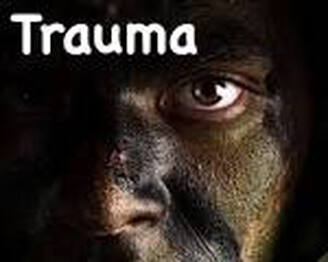~ Posttraumatic Stress Disorder (PTSD) ~
|
PTSD is defined as the exposure to actual or threatened death, serious injury, or sexual violence, in one or more of the following ways: by directly experiencing the event, by witnessing the event (in person) as it was occurring to someone else, by learning that a traumatic event occurred to a close family member or friend, and by experiencing repeated or extreme exposure to aversive details of a traumatic event (such as is the case with first responders and trauma therapists).
Having experienced one of these events, the symptoms of the disorder include experiencing recurrent, involuntary and intrusive distressing memories fo the traumatic event, and/or experiencing recurrent distressing dreams in which the content and/or affect of the dream are |
related to the traumatic event itself, or experiencing dissociative reactions in which the individual feels or acts as if the traumatic event or events were recurring, and/or, experiencing intense or prolonged psychological distress at exposure to internal or external cues that symbolize or resemble an aspect of the traumatic event, and/or experiencing marked physiological reactions to internal or external cues that symbolize or resemble an aspect of the traumatic event, and/or experiencing persistent avoidance of stimuli associated with the traumatic event, beginning after the event occurred as evidenced by either avoidance of or efforts to avoid distressing memories, thoughts, or feelings about or closely associated with the traumatic event, and/or avoidance of or efforts to avoid external reminders that arouse distressing memories, thoughts, or feelings about or closely associated with the traumatic event, and/or negative alterations in cognitions and mood associated with the traumatic event, beginning or worsening after the traumatic event occurring as evidenced by the inability to remember and important aspect of the traumatic event, and/or persistent and exaggerated negative beliefs or expectations about oneself, others, or the world, and/or persistent, distorted cognitions about the cause or consequence of the traumatic event that lead the person to blame his or herself or other, and/or the markedly diminished interest or participation in significant activities, and/or the feelings of detachment or estrangement from others, and/or the persistent inability to experience positive emotions, and/or marked alteration in arousal and reactivity associated with the traumatic event, beginning or worsening after the traumatic event occurred, including having reckless or self-destructive behavior, hypervigilance, exaggerated startle response, problems with concentration, sleep disturbance, duration of the disturbance is more than one month, and/or the disturbance causes clinically significant distress or impairment in social , occupational, or other important areas of personal functioning, and/or the disturbance is not attributable to the physiological effects of a substance.. Ones' PTSD is either that of depersonalization, or derealization.
Please be aware that this is NOT the entirety of what qualifies as having this disorder, but is only a subset of items associated with PTSD as defined, in part, from the latest iteration of the Diagnostic and Statistical Manual of Mental Disorders-5. CAVEAT: It is important to note that PTSD or ANY psychological disorder is not a sum of checked items. The diagnosis of any . psychological disorder can only be accurately made from a qualified Ph.D. in clinical psychology or neuropsychology or MD in psychiatry.
If you are concerned that you or someone you know may have PTSD and you would like more information, please contact Dr Ullman for further assistance.
Please be mindful when using the information presented on this website when used to diagnose self or other by clicking HERE to read the important caveat.

